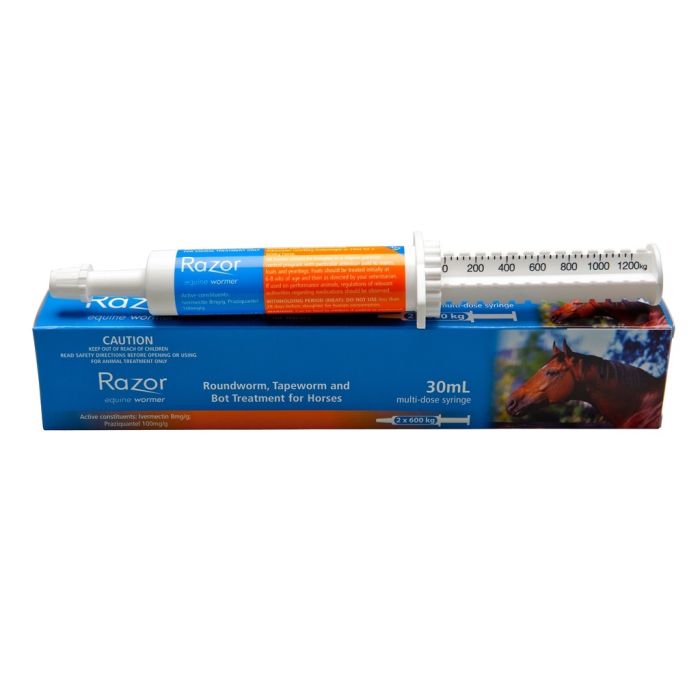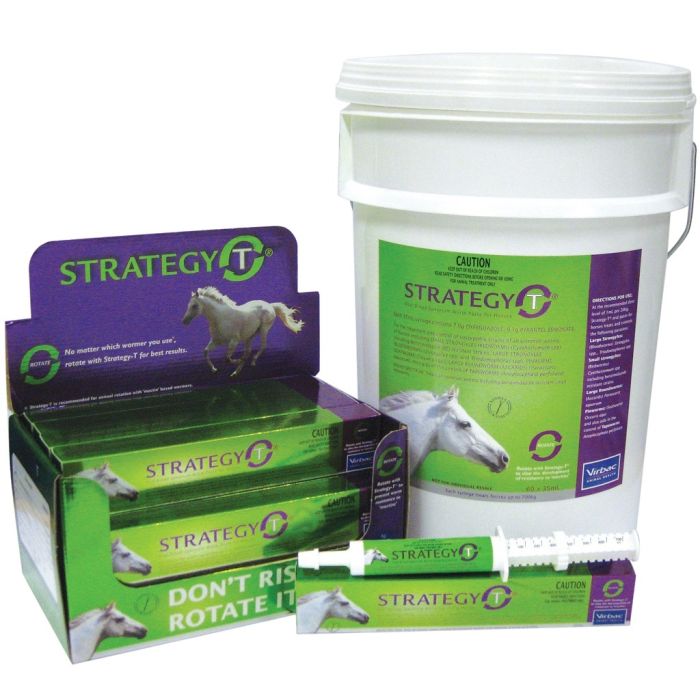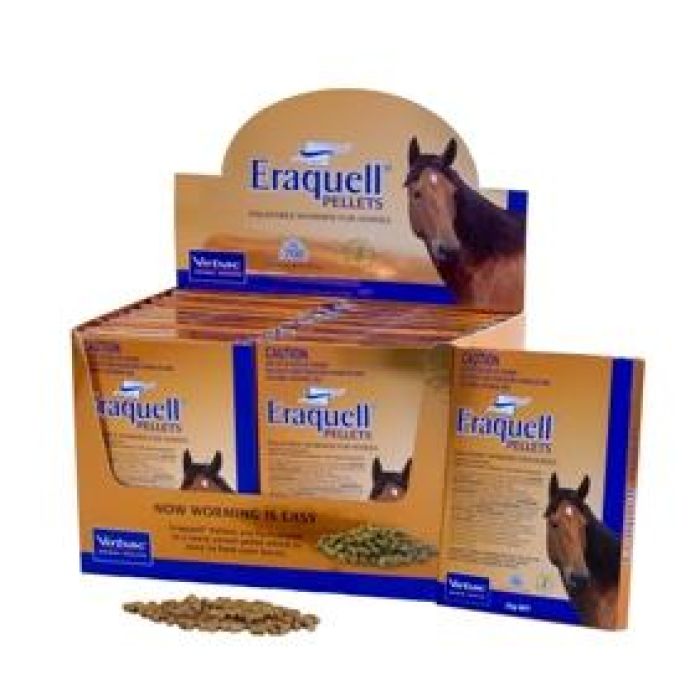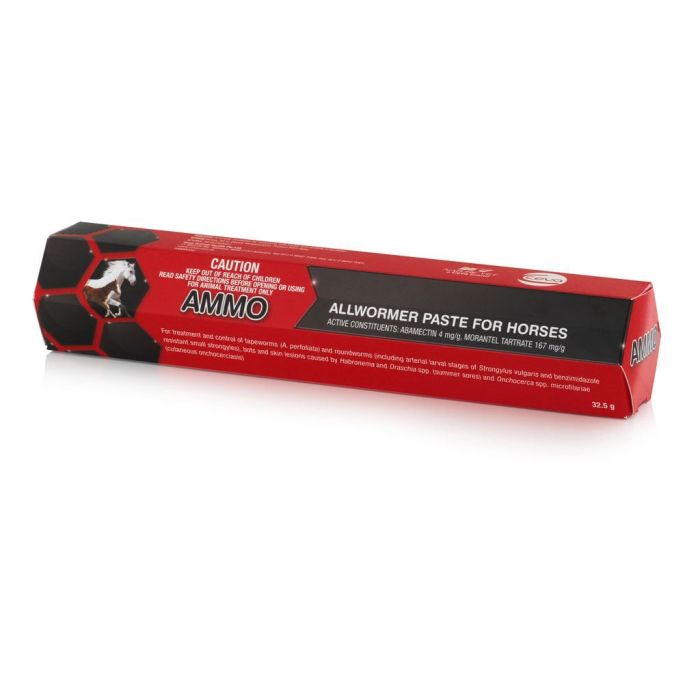Razor Equine Wormer 30mL Stud Bucket
VIR-12480
Razor Equine Wormer - Ivermectin / Praziquantel Paste.
Strategy T
35g
Razor Wormer, horse wormer, clears roundworms in both adult and larval stages and benzimidazole resistant strains of small strongyles.
Ingredients:
Ivermectin 8mg/g,
Praziquantel 100mg/g
Dosage Rate
1ml per 40kg of Horse
| Weight | Dosage | Doses per syringe |
| 80kg (small Mini) | 2mL | 15 |
| 120kg (large mini) | 3mL | 10 |
| 300kg (Pony) | 7.5mL | 4 |
| 400kg (Galloway) | 10mL | 3 |
| 600kg (large Horse) | 15mL | 2 |
Razor Wormer, horse wormer, is safe to treat foals from 6-8 weeks of age. Mares may be treated at any stage of pregnancy and stallions may be treated with no effect on fertility.
The consistently smooth, flavoured paste in Razor Wormer provides a palatable, concentrated broad-spectrum worming dose for horses of all ages.
Actions Razor Wormer, horse wormer, is recommended for the treatment and control of roundworms (including arterial larval stages of Strongylus vulgaris and benzimidazole resistant small strongyles), tapeworms, bots and skin lesions (summer sores) caused by Habronema and Draschia spp. and Onchocerca spp. (cutaneous onchocerciasis).
Indications For the treatment and control of roundworms (Parascaris equorum), strongyles ( including arterial larval stages of Strongylus vulgaris and benzimidazole resistant small strongyles), tapeworms, bots and skin lesions (summer sores) caused by Habronema Draschia spp and Onchocerca spp (cutaneous onchocerciasis).
At the recommended dose level of 1mL/40kg, Equine Razor Wormer controls the following parasites: Tapeworms: Anoplocephala perfoliata, Anoplocephala magna, Paranoplocephala mammillana (adult and immature heads and segments). Large Strongyles: Strongylus vulgaris (adults and arterial larval stages), Strongylus edentatus (adults and tissue stages), Strongylus equinus (adults) and Triodontophorus spp. (adults). Small Strongyles: Including benzimidazole resistant strains (Cyathostomum spp. Cylicocyclus spp., Cylicostephanus spp., Cylicodontophorus spp., Gyalocephalus spp.) Pinworms: Oxyuris equi (adult and immature). Ascarids: Parascaris equorum (adult and immature). Hairworms: Trichostrogylus axei (adult). Large Mouth Stomach Worms: Habronema muscae (adult). Neck Threadworms: Onchocerca spp. (microfilariae).
Bots: Gasterophilus spp. (oral and gastric stages). Lungworms: Dictyocaulus arnfieldi (adult and immature). Intestinal Threadworms: Strongyloides westeri (adult).
Equine Razor Wormer, horse wormer, is also effective for the control of skin lesions caused by Habronema and Draschia spp. cutaneous larvae (summer sores), and Onchocerca spp. microfilariae (cutaneous onchocerciasis).
Safety Directions: Harmful if swallowed. May irritate the eyes and skin. Avoid contact with eyes and skin. Wash hands after use. Please refer to MSDS for detailed instructions.
First Aid: If poisoning occurs, contact a doctor or Poisons Information Centre (In Australia Tel: 13 11 26).
Disposal: Dispose of empty syringe by wrapping with paper and placing in garbage.
Withholding Period Meat: 28 days.
Worming intervals
How often horses are wormed depends on the property’s management system. It is ideal to use the minimum number of treatments possible in a year, as over worming can lead to resistance. Depending on a number of factors, some horse owners will need to worm more often than others. Where there are large numbers of horses kept close together and/or horses are frequently moving on and off a property, there will be a greater need for worm control. This is because these horses will be at the greatest risk of contamination. Horses in these situations, generally on studs or agistment properties, will need to be wormed every six to eight weeks. It may be possible, where there are low stocking densities, to worm horses less often. The use of paddock management procedures like manure removal, paddock rotation and grazing with other species will also help lower contamination pressure.
All horses should be wormed at least once every 3 months regardless of the conditions in which they are kept. All horses on a property should be wormed at the same time. New horses should be quarantined and wormed before coming onto the property. If you are unsure about what drenching interval is right for your situation please consult your vet or local Virbac area manager.
Rotation
Worms can develop resistance to worming compounds. Once this occurs, the wormer loses its effectiveness and the horse can remain infected with worms even while being treated regularly. In order to avoid or slow the development and spread of resistance the following rotational strategy is recommended.
How often horses are wormed depends on the property’s
management system. It is ideal to use the minimum number of
treatments possible in a year, as over worming can lead to resistance.
Depending on a number of factors, some horse owners will need
to worm more often than others.
Where there are large numbers of horses kept close together
and/or horses are frequently moving on and off a property,
there will be a greater need for worm control. This is because
these horses will be at the greatest risk of contamination.
Horses in these situations, generally on studs or agistment
properties, will need to be wormed every six to eight weeks.
It may be possible, where there are low stocking densities, to worm
horses less often. The use of paddock management procedures like
manure removal, paddock rotation and grazing with other species
will also help lower contamination pressure.
All horses should be wormed at least once every 3 months
regardless of the conditions in which they are kept. All horses on a
property should be wormed at the same time. New horses should
be quarantined and wormed before coming onto the property.
If you are unsure about what drenching interval is right for your
situation please consult your vet or local Virbac area manager.
Rotation
Worms can develop resistance to worming compounds.
Once this occurs, the wormer loses its effectiveness and the
horse can remain infected with worms even while being treated
regularly. In order to avoid or slow the development and spread
of resistance the following rotational strategy is recommended.




